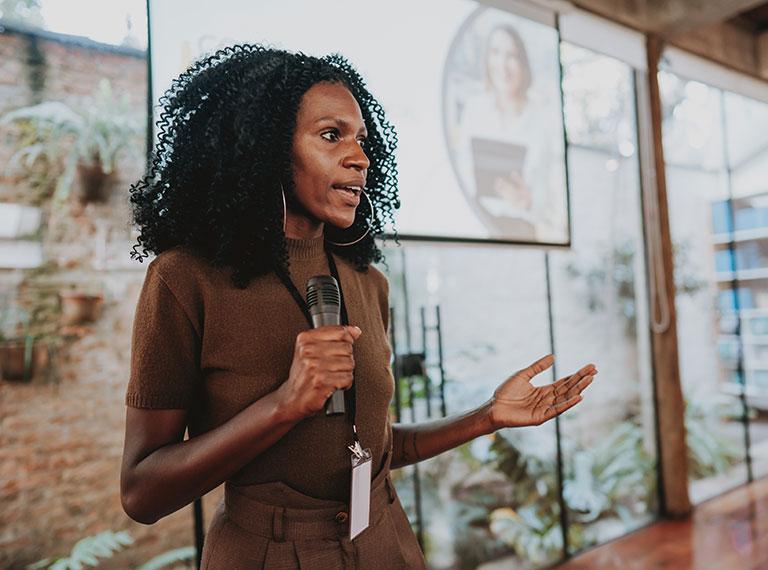Take Dr Maggie Aderin-Pocock MBE, whose work on space instrumentation has advanced our understanding of the universe. Having spoken to approximately 25,000 children, many from inner-city schools, explaining how and why she became a scientist, she is challenging perceptions about careers, class, and gender.
Think of Frank Bailey, one of London's first Black firefighters who fought for workplace equality in the 50s, after being told by a delegate at the Fire Brigades Union conference that Black people were not employed by the fire service because they were "not educated or strong enough".
And Dr Nira Chamberlain, whose mathematical modelling has impacted industries from engineering and energy to defence and retail. Inspired by childhood hero Mohammed Ali's sheer self-confidence, he continued studying maths in the face of a complete lack of encouragement from teachers and professors along the way.
These pioneers, and so many others, don’t just innovate, they persevered through systemic barriers to leave legacies that still influence our lives.
This Black History Month, let’s go beyond celebrating these accomplishments and use them as a springboard for action. What lessons can today's leaders, innovators, and organisations take from these trailblazers?
Five lessons from Black history’s innovators
1. Innovation thrives on diverse perspectives
Breakthroughs rarely happen in a vacuum. Instead, they often emerge at the intersection of diverse thoughts and experiences, where different ideas collide and spark new solutions. Throughout history, Black innovators have consistently challenged established norms, bringing unique perspectives to industries ripe for disruption. Their ability to see problems and opportunities from different angles has often led to groundbreaking advancements. For contemporary organisations, this underscores the critical importance of not just inviting diverse voices to the table but actively cultivating an environment where these voices are genuinely heard, respected, and integrated into decision-making processes at every level. This fosters a culture where innovation can truly flourish.
2. Resilience fuels progress
The path of innovation is rarely smooth. The remarkable perseverance of Black pioneers, who navigated not only technical difficulties but also systemic prejudice, is a powerful testament to this. Their unwavering commitment to their vision, despite formidable obstacles, reminds us that sustained progress is born from an ability to adapt and persist. For modern businesses, this translates into fostering a workplace where overcoming adversity is celebrated. By encouraging a growth mindset and providing resources for employees to navigate difficulties, organisations can build teams that remain committed to their goals, even when confronted with significant hurdles.
3. Resourcefulness unlocks opportunity
Many Black innovators created world-changing inventions with limited access to funding, materials, and formal networks. Think of Ignatius Sancho, born aboard a slave ship and later enslaved in Britain, Sancho taught himself to read and write, eventually becoming a published author and composer. He gained financial independence and became the first known Black person to vote in a British election, using his voice to challenge the slave trade and advocate for human dignity.
These pioneers excelled at making the most of what they had, turning constraints into catalysts for creativity and change. For today's leaders, this teaches the value of resourcefulness. It's a reminder that groundbreaking ideas don't always require billion-pound budgets. By empowering teams to think creatively and embrace lean methodologies, organisations can unlock new opportunities and solve complex problems with surprising efficiency.
4. Community is a cornerstone of success
Black innovators rarely succeeded in isolation. They were often supported by strong communities - families, mentors, and networks that provided encouragement, resources, and collaboration. For example, the West Indian community in Notting Hill, through figures like Claudia Jones, established a carnival that became a powerful symbol of cultural pride and resilience, fostering a model of community-based empowerment. This highlights that individual achievement is often rooted in collective support. Modern organisations can learn from this by fostering internal communities and mentorship programmes that create a sense of belonging and shared purpose, ensuring that no employee feels they must navigate their career path alone.
5. Legacy matters
The impact of these innovators extends far beyond their immediate contributions; they were building foundations for future generations. Their work laid the groundwork for entire fields and inspired countless others, demonstrating a foresight that prioritised long-term societal benefit. Today, we inherit this powerful legacy, and with it, a profound opportunity to continue creating lasting, equitable change. This means actively investing in and supporting Black talent, nurturing Black-owned businesses, and strengthening communities through targeted initiatives. By ensuring that the next generation of trailblazers has access to resources and equitable opportunities, we can honour the past by actively shaping a more inclusive and innovative future.
If you are looking for a talented professional to join your team, or seeking a new opportunity yourself, get in touch with one of our local recruitment specialists today.




